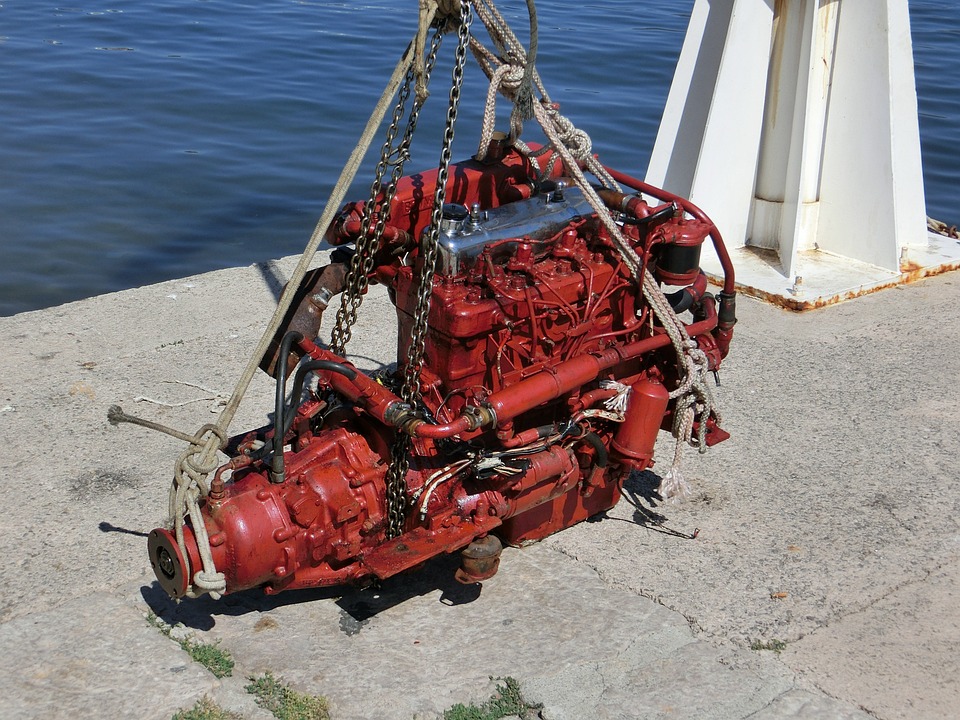Guide to Types of Marine Engines

With various types of marine engines available, selecting the right one is crucial for efficiency, performance, and environmental sustainability.
This blog explores the primary types of marine engines, their characteristics, advantages, and applications.
1. Internal Combustion Engines (ICE)
Internal Combustion Engines (ICE) ICEs dominate the marine industry due to reliability and cost-effectiveness. – 2-Stroke and 4-Stroke Engines – Fuel Types: Diesel, Gasoline, and Dual-Fuel – Advantages: High power-to-weight ratio, Wide range of power outputs, Well-established maintenance infrastructure – Disadvantages: Emissions and environmental concerns, Noise and vibration.
2. Gas Turbine Engines
Gas Turbine Engines Gas turbines offer high power density and efficiency. – Advantages: Compact design, Low vibration, High-speed operation – Disadvantages: High fuel consumption, Complex maintenance, Limited flexibility – Applications: Naval vessels, High-speed ferries, Offshore platforms
3. Steam Turbine Engines
Steam Turbine Engines Steam turbines provide efficient power for large vessels. – Advantages: High efficiency, Low maintenance, Fuel flexibility – Disadvantages: Complex boiler systems, Slow start-up times – Applications: Cruise ships, Container vessels, Tankers
4. Electric Motors
Electric Motors Electric motors gain popularity due to environmental concerns. – Types: AC Induction, DC, Permanent Magnet – Advantages: Zero emissions, Low noise, High efficiency – Disadvantages: Limited range, Charging infrastructure – Applications: Electric and hybrid ferries, Tugboats, Recreational boats
5. Hybrid Engines
Hybrid Engines Hybrid engines combine ICEs with electric motors. – Advantages: Fuel efficiency, Reduced emissions, Increased flexibility – Disadvantages: Higher upfront costs, Complex systems – Applications: Passenger vessels, Offshore support vessels, Naval ships
6. Nuclear Reactors
Nuclear Reactors Nuclear reactors power some naval vessels. – Advantages: Long-term energy density, Low maintenance, High power output – Disadvantages: Safety concerns, Complex operations, Waste disposal – Applications: Aircraft carriers, Submarines.
7. Emerging Technologies
Emerging Technologies – Hydrogen Fuel Cells – Advanced Diesel Engines – Wind-Assisted Propulsion – Solar-Powered Vessels 8. Engine Selection Considerations – Power requirements – Fuel efficiency – Emissions regulations – Maintenance costs – Application-specific demands
Engine Selection Considerations
Engine selection requires careful consideration of multiple factors. By prioritizing vessel requirements, engine characteristics, operational needs, regulatory compliance, economic factors, manufacturer support, and future-proofing, vessel owners and operators can ensure optimal performance, efficiency, and sustainability.
Selecting the right engine for a marine vessel is crucial for optimal performance, efficiency, and sustainability.
Vessel Requirements
Size and type (recreational, commercial, naval)
Speed and power requirements
Operating conditions (freshwater, saltwater, tropical, Arctic)
Cargo or passenger capacity
Engine Types
Internal Combustion Engines (ICE), Gas Turbine Engines, Steam Turbine Engines, Electric Motors, Hybrid Engines, Nuclear Reactors
Engine Characteristics
Power output (hp/kW), Fuel type (diesel, gas, dual-fuel), Fuel efficiency (consumption, emissions), Weight and size, Maintenance requirements, Noise and vibration levels
Operational Considerations
Route and operating profile, Load factors (constant, variable), Idling and standby requirements, Maneuverability and handling
Regulatory Compliance
Emissions regulations (IMO, EPA)
Safety standards ( SOLAS, USCG)
Environmental regulations (ballast water, waste management)
Economic Factors
Initial cost and investment, Operating costs (fuel, maintenance), Lifecycle costs, Resale value
Manufacturer and Support, Reputation and reliability, Warranty and support, Spare parts availability, Training and service
Future-Proofing
Emerging technologies (hydrogen, electric), Future emissions regulations, Adaptability and upgradability
Steps to consider for selecting the right marine engine
Define vessel requirements, Evaluate engine types and characteristics, Assess operational considerations, Ensure regulatory compliance, Consider economic factors, Research manufacturer and support, Plan for future-proofing
Maintenance and Repair
Maintenance and Repair – Regular maintenance schedules – Overhaul and repair procedures – Troubleshooting common issues
Regular maintenance is crucial to ensure optimal performance, extend lifespan, and prevent costly repairs of marine engines.
Maintenance Schedule: Daily checks: oil levels, coolant, fuel, and electrical systems
Weekly checks: battery condition, bilge pumps, and steering gear
Monthly checks: engine oil analysis, fuel filters, and propeller shaft
Annual checks: engine overhaul, cooling system flush, and electrical system inspection Common Maintenance Tasks: Oil changes and filter replacement
Fuel system cleaning and maintenance 3. Cooling system maintenance (flushing, cleaning)
Electrical system checks (battery, alternator, starter)
Propeller shaft and stern tube maintenance Repair Procedures:
Troubleshooting: identify issues using diagnostic tools
Engine overhaul: replace worn components, bearings, and seals
Component replacement: pumps, turbines, and gearboxes
Welding and fabrication: repair or replace damaged structures
Electrical system repairs: rewiring, circuit breaker replacement Best Practices:
Follow manufacturer guidelines
Keep maintenance records
Use genuine spare parts
Train crew members on basic maintenance
Schedule regular dry-docking for hull inspection and maintenance Common Issues:
Engine overheating, Oil leaks, Fuel contamination, Electrical system failures, Corrosion and rust
Preventative Measures:
Regular cleaning and lubrication
Monitor engine performance
Implement fuel management systems
Install corrosion protection systems
Conduct regular inspections Tools and Equipment:
Multimeter, Oscilloscope, Pressure gauge, Leak-down tester, Welding equipment
Training and Certification:
Manufacturer training programs, Marine engineer certification, Engine-specific training Safety training (e.g., fire safety, electrical safety)
Regular maintenance and timely repairs are essential to ensure marine engine reliability, efficiency, and longevity. By following best practices and staying informed about common issues, vessel owners and operators can minimize downtime and ensure safe operations
The diverse range of marine engines caters to various maritime needs. Understanding the characteristics and applications of each engine type enables maritime professionals to optimize vessel performance, reduce environmental impact, and ensure safe operations